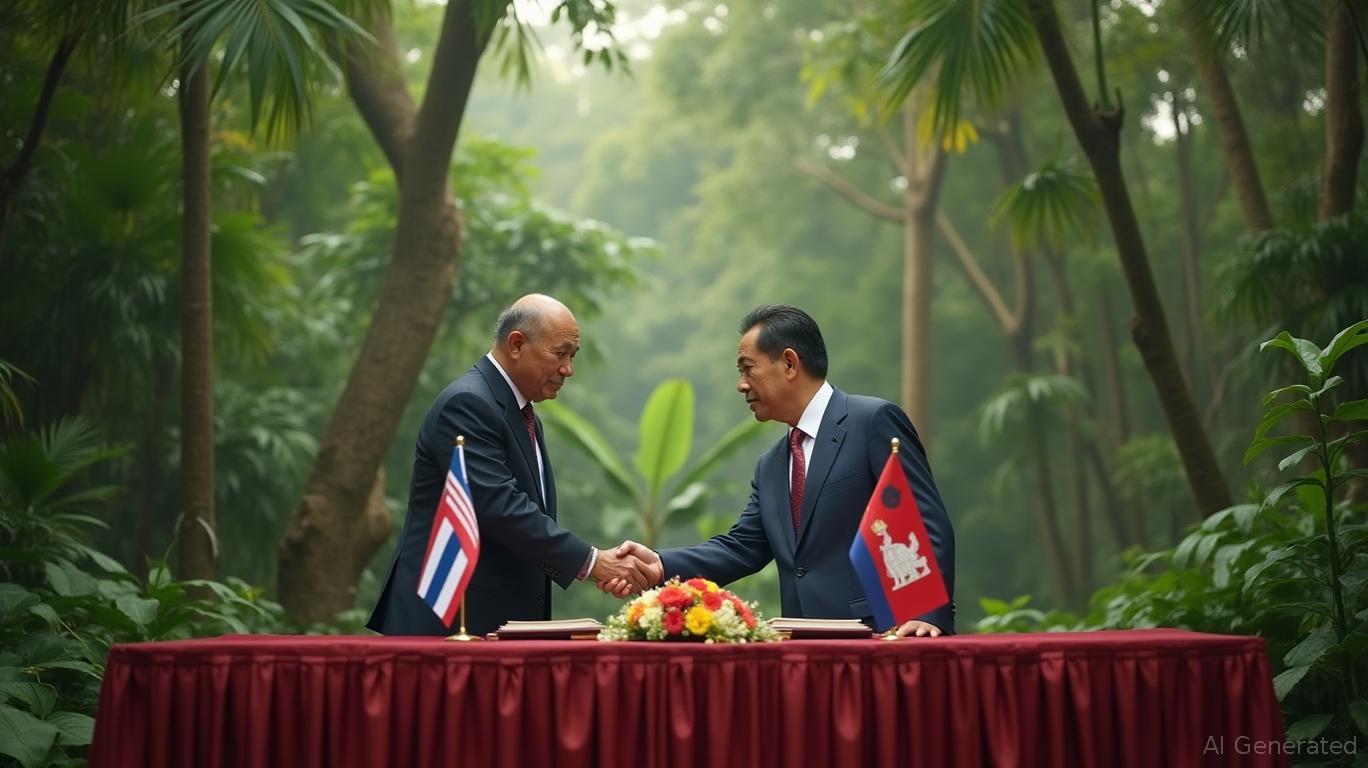U.S.-Supported Thailand-Cambodia Accord: A Strategic Geopolitical Maneuver for Stability in Southeast Asia
- Thailand and Cambodia near historic peace deal, backed by U.S., to end border clashes with weapon withdrawals and joint de-mining. - U.S. involvement highlights regional influence amid China’s growing presence, with Trump set to witness the October 25 signing. - Thailand unveils $150M tourism stimulus to boost domestic travel, balancing fiscal prudence with growth targets. - China-U.S. trade talks in Malaysia aim to ease tensions over tariffs, with both sides addressing trade barriers and rare-earth expo
Thailand and Cambodia are close to reaching a landmark peace deal aimed at ending months of violent border disputes, with U.S. President Donald Trump expected to attend the signing ceremony during the ASEAN summit in Kuala Lumpur. Thai Defense Minister Natthaphon Narkphanit noted that the negotiations have made "substantial headway," as both countries have agreed to pull back heavy weaponry from contested areas, begin collaborative landmine clearance, and form a joint task force to combat cybercrime. The agreement, anticipated to be formalized on October 25, represents a major advance for stability in Southeast Asia, a region long challenged by territorial conflicts and political friction, according to
This accord unfolds against a backdrop of shifting geopolitics, with the U.S. aiming to bolster its regional role as China’s influence expands. American mediation in the July ceasefire and the participation of U.S. observers in ongoing discussions highlight the deal’s strategic weight. Cambodia’s Deputy Prime Minister Tea Seiha stressed the importance of "reciprocal trust and assurance" throughout the talks, which also involve the release of 18 Cambodian soldiers held in detention,

Separately, Thailand’s tourism industry is poised to benefit from a 150 million dollar stimulus initiative designed to encourage local travel and aid economic revival. The government has introduced tax breaks for both individuals and companies, with special incentives for visiting less-traveled provinces and organizing business events. Finance Permanent Secretary Lavaron Sangsnit explained that these policies are intended to spur spending before the peak tourism season, potentially boosting GDP growth by 0.04%. However, the plan is expected to reduce tax income by about 5 billion baht, illustrating the challenge of balancing fiscal responsibility with economic support, as reported by
At the same time, American and Chinese representatives are preparing for trade discussions in Malaysia, aiming to ease tensions heightened by Trump’s recent tariff threats on Chinese imports. The Chinese delegation, led by Vice Premier He Lifeng, will address topics such as rare-earth exports and trade restrictions,
The intersection of these events underscores the shifting economic and political environment in Southeast Asia. Thailand’s internal reforms and diplomatic initiatives are in step with broader U.S. and Chinese efforts to influence trade and security in the region. As ASEAN leaders convene in Kuala Lumpur, the outcomes of the Thailand-Cambodia peace agreement and the China-U.S. trade talks may set important examples for future regional cooperation amid intensifying strategic rivalry.
Disclaimer: The content of this article solely reflects the author's opinion and does not represent the platform in any capacity. This article is not intended to serve as a reference for making investment decisions.
You may also like
Privacy-centric Zcash Rises as Regulatory Ambiguity Increases Interest Among Retail Investors
- Zcash (ZEC) surged 27% in a day, hitting $240.25, with a 378.9% monthly gain and $3.9B market cap. - Bitstamp CEO Barry Silbert highlighted ZEC's privacy appeal amid regulatory uncertainty and BlackRock's ETF rejection. - ZEC's zero-knowledge proof protocol drives demand for privacy-focused crypto amid rising regulatory scrutiny. - Analysts warn of potential corrections as ZEC trades above its 52-week average, testing rally sustainability. - The surge reflects investor interest in niche projects with str

Cardano News Today: Cardano's Approach to Domains: Balancing Centralization Issues with Web3 Goals
- Cardano Foundation seeks .ada and .cardano TLDs to strengthen brand control and enable Web2-Web3 interoperability, budgeting $700k for application and $350k annual registry costs. - ADA shows 70M whale accumulation and bullish technical signals (golden cross, triangle pattern), though recent 12% dip below $0.66 raises short-term correction risks. - T. Rowe Price's ADA-inclusive crypto ETF filing and SEC's 16 ETF decisions highlight growing institutional interest, while community debates TLD governance ce

Bitcoin Updates Today: Bitcoin's Bullish Trend: Institutional Investments and ETF Growth Strengthen Market Stability
- Bitcoin's bull market remains intact with institutional holdings and ETF adoption reinforcing long-term resilience, per FXStreet and BeInCrypto analyses. - U.S. BTC/ETH ETFs now manage $175B+ assets, with BlackRock's IBIT holding $86B alone, signaling institutional confidence in crypto as inflation hedge. - Dolphin wallets (100-1,000 BTC) control 26% of supply and show structural strength, though liquidity inventory has fallen to 8.3 months. - Tesla and SpaceX maintain $2.33B+ in Bitcoin reserves, with S

Bitcoin Updates: Production Slowdown and Accommodative Fed Policies Extend Bitcoin's Bull Market Through 2026
- Analysts like Raoul Pal link Bitcoin's bull cycle to ISM PMI stagnation below 50, predicting a 2026 peak as historical patterns suggest prolonged expansion. - Manufacturing struggles (high tariffs, weak demand) delay PMI recovery, historically tied to Bitcoin's upward momentum, with Q3/Q4 2025 peaks possible. - BTC's 92% YTD surge and low MVRV ratio (3.11) indicate undervaluation, while Fed's 1.77% TIPS yields and S&P 500 correlation (0.86) support liquidity. - Geopolitical risks (U.S.-China tariffs, Sou
